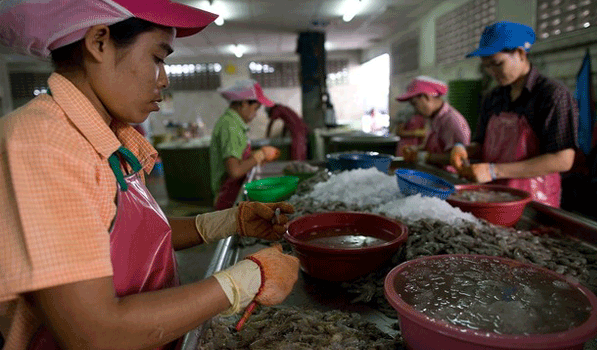Thailand has agreed to adopt a new, less restrictive policy for Burmese migrant workers whose visa extensions for temporary passports are currently limited to no more than four years’ continuous work in the country.
The leader of a Burmese migrant worker rights group told The Irrawaddy on Monday that “the Thai employment director general said the Thai government has changed the policy” at a meeting in Bangkok on Sunday.
Aung Kyaw, chairman of the Bangkok-based Migrant Workers Rights Network, said Pravit Khiengpol, a director general from Thailand’s Department of Employment, confirmed that under the revised policy, Burmese migrant workers residing in Thailand for four years would be allowed to re-enter the country for work after leaving for one month. The change would be a significantly less burdensome stipulation than the current policy.
Following the introduction of a national verification process for Burmese migrants in 2009, Thailand and Burma have managed cross-border employment affairs under a memorandum of understanding (MoU) that has limited migrant laborers’ ability to work in the neighboring kingdom. The MoU states that Burmese migrants who hold temporary passports must return to their home country after four years of working in Thailand, and are allowed to re-enter Thailand only after spending three years outside the country’s borders.
The Migrant Workers Rights Network has for years argued that the policy creates confusion and an opportunity for unscrupulous Thai employment agencies to trick or exploit Burmese migrant workers.
“The director general told us that the details will be announced only after both [Thai and Burmese government representatives] hold a meeting on September 5, Thursday, in Bangkok,” added Aung Kyaw.
Tin Win, Burma’s ambassador to Thailand, told The Irrawaddy on Monday that the Burmese Embassy was negotiating with the Thai Ministry of Labor in an effort to secure an even more favorable agreement allowing Burmese migrant workers to extend their visas with only a cursory trip across the border.
“We are still preparing for the migrant workers issue, now we are negotiating to be able to extend [the visa] within one day,” said Tin Win, “so that the workers will only need to go back over the border for one night, and then re-enter [Thailand].”
The ambassador said negotiations over a one-night arrangement are ongoing, and urged Burmese migrant workers to adhere to whatever terms are agreed to for the revised Thai policy, which places restrictions on work visas due to Bangkok’s desire to exercise control over the flow of immigrants across its borders.
Burmese government representatives were not present at Sunday’s meeting, which was attended by the Thai Labor Solidarity Committee, the State Enterprises Workers’ Relations Confederation of Thailand, the Migrant Workers Rights Network, and Thai immigration and labor officials, according to Aung Kyaw.
There are about 3 million Burmese migrants in Thailand, 1.7 million of which have been processed under the national verification program and provided with temporary passports, according to Tin Win. From that figure, about 400,000 of the 1.7 million registered Burmese migrants have stayed in Thailand beyond their four-year visa limit, exposing them to legal risks and leaving them ripe for exploitation.
The Thai border towns at which Burmese migrants would be able to have their visas issued and extended are Mae Sot, Mae Sai, Ranong, and Kanchanaburi. Under current policy, the four locations only allow for visa extensions at their immigration facilities.

















